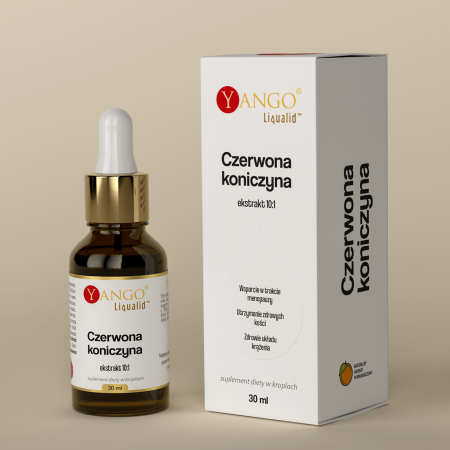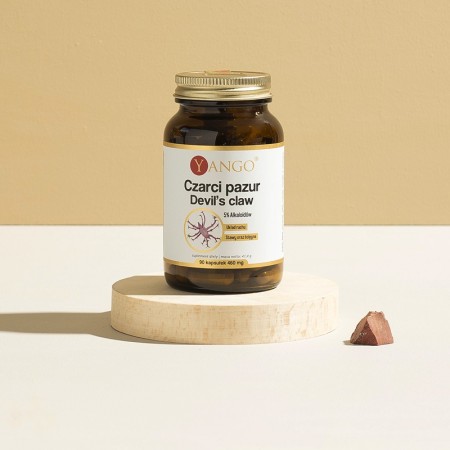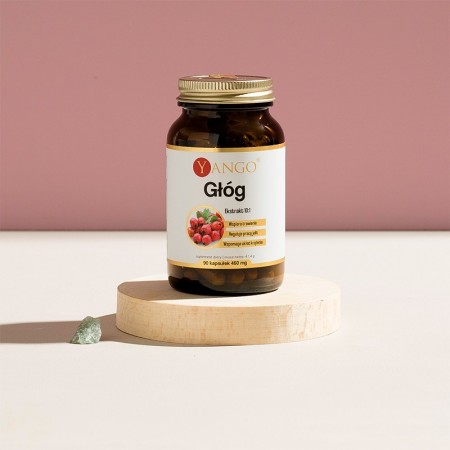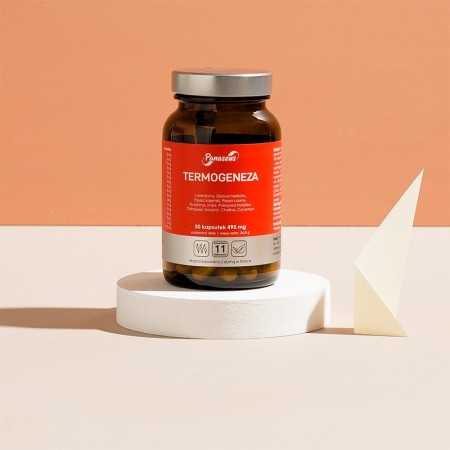Dostępny
Ashwagandha 10% vitanolides - 90 capsules.
zł58.40
![]() A natural adaptogenic herb.
A natural adaptogenic herb.
![]() Stress reduction.
Stress reduction.
![]() Immune system support.
Immune system support.
![]() Improved well-being.
Improved well-being.
![]() Improved quality of sleep.
Improved quality of sleep.
![]() High standardization on active ingredients.
High standardization on active ingredients.
-
 Vegan
Vegan
-
 Standaryzowany
Standaryzowany
-
 Polska firma
Polska firma
Ashwagandha - Indian ginseng
High dose of antioxidants and support for the immune, cardiovascular and nervous systems.
Ashwagandha (Withania somnifera), or sluggish vitania, is an herb that has been used in Ayurvedic medicine for thousands of years. According to both ancient records and modern use, ashwagandha is considered an adaptogen - that is, a substance that helps the body cope with stress.
Scientifically documented effects associated with ashwagandha include:
- Reducing stress and anxiety1,2
- Improving mood3,4
- Effects on sleep quality5,6,7
- Improving brain function and memory8,9,10,11
- Effects on increasing physical performance and reducing fatigue12,13,14,15,16,17
- Normalization of blood sugar and cholesterol levels18,19,20,21
- Support of immune and endocrine system function22,23,24,25,26,27,28
What is Ashwagandha?
Ashwagandha is one of the most important herbs in Ayurveda, which is a traditional form of natural medicine that originated in India. It has used ashwagandha for thousands of years to relieve stress, increase energy levels and improve concentration29.
In Sanskrit, the word "ashwa" means "horse," while "gandha" means "fragrance." Ashwaganda is a small evergreen shrub, low and squat with velvety leaves and bell-shaped flowers, bearing orange fruits similar in appearance to small tomatoes30,31.
Ashwagandha has a wide range of therapeutic uses in all systems of the human body. The plant has been extensively studied for various pharmacological properties, such as antioxidant, anti-anxiety, adaptogenic, and memory-enhancing.
Ashwagandha properties
Adaptogens are substances of natural origin, usually herbs or other plant products, which have a positive effect on the state of the nervous system and brain. The term was introduced by Russian scientist Nikolai Lazarev, who formulated 3 postulates outlining the conditions that a plant must meet to be considered an adaptogen.
What must an adaptogen be characterized by?
- Not toxic to the body
- Helps adapt to stress, reducing its impact on the body
- Normalizes and improves various bodily functions, contributing to well-being
Ashwagandha fulfills the above characteristics of an adaptogen and is listed among the most highly regarded adaptogenic plants32,33,34,35,36.
How does ashwagandha work and what does it help with?
Over the past few years, Indian ginseng in supplementation has been gaining popularity, especially when it comes to dietary supplements in capsules. No wonder - after all, its numerous properties have been valued for a very long time. Below, we have gathered the most important findings on the effects of sluggish vitania, based on modern scientific research.
1. lower stress and anxiety levels
Perhaps the most widely known action of ashwagandha is related to its effects on stress levels. It is classified as an adaptogen, a substance that helps increase the body's resistance to stress.
Several studies have shown that supplements containing ashwagandha extract can help alleviate stress and anxiety. One involved supplementation with 250-600 mg of ashwagandha extract for 8 weeks. During this time, participants' perceived stress levels, as well as cortisol (the stress hormone) levels, decreased significantly compared to the control group. What's more, there was also a significant improvement in sleep quality in the supplement group37.
Another study found that those taking 240 mg of ashwagandha extract daily for 60 days saw a marked decrease in anxiety symptoms compared to the placebo group38.
Although the research is still at a relatively early stage, the calming effects of ashwagandha seem promising for people struggling with a lot of stress in their daily lives.
2 Improving sports performance
Studies have shown that athletes can also benefit from the effects of ashwagandha, as the plant's properties can have beneficial effects on physical performance. One analysis included 12 studies in men and women taking ashwagandha root extract in doses ranging from 120 mg to 1,250 mg daily. The results suggested that with ashwagandha, participants increased their physical performance - including strength and blood oxygenation during exercise39.
Another analysis, this time of five studies, found that regular intake of ashwagandha-based supplements significantly increased the body's aerobic capacity (VO2max) in healthy adults and athletes40. This is the maximum amount of oxygen that can be used during intense activity. It is an important indicator of heart and lung performance.
That's not all - ashwagandha users have also reported other positive effects of the herb. In one study, participants doing regular resistance training who took 600 mg of ashwagandha extract daily for 8 weeks saw significantly greater benefits in terms of muscle strength and size compared to the placebo group41.
3 Effects on symptoms of certain mental illnesses
Some evidence suggests that ashwagandha may work on our bodies to alleviate symptoms of some mental illnesses, including depression. In one study, researchers looked at the effects of ashwagandha in 66 people experiencing depression and anxiety. They found that participants who took 1,000 mg of ashwagandha daily for 12 weeks saw a much more severe reduction in symptoms than the placebo group42.
In addition, a 2012 study. showed that stressed adults who took 600 mg of ashwagandha extract daily for 60 days reported a reduction in depressive symptoms by nearly 80%, while the control group saw their symptoms decrease by only 5% over that time43.
Important: While some research suggests that ashwagandha helps with depression symptoms in some people, we strongly discourage trying to replace antidepressants with it. If you are experiencing symptoms of depression or other mental illness, it is imperative that you consult a qualified psychiatrist to determine appropriate treatment.
4. can help increase testosterone levels and improve fertility in men
The popularity of ashwagandha supplementation among men did not come out of nowhere. Some studies have shown that ashwagandha has effects that can improve fertility among men and increase their testosterone levels.
In one study, 43 men aged 40-70 supplemented with ashwagandha extract or a placebo daily for 8 weeks. Taking ashwagandha resulted in an 18% increase in DHEA-S, the sex hormone involved in testosterone production. Participants who supplemented with the root extract also had a 14.7% higher increase in testosterone levels than the control group44.
In addition to this, a review of four studies found that the use of ashwagandha significantly increased semen concentration and volume, as well as sperm motility in men with low and normal sperm counts. However, the researchers concluded that there is currently not enough data to confirm the potential therapeutic properties of ashwagandha for male fertility, and that more research is needed in this regard45.
5. can lower blood sugar levels
The results of some studies suggest that Ashwagandha may have some benefits for people with diabetes or high blood sugar. A review of 24 studies (including five clinical trials among people with diabetes) found that including ashwagandha in the diet had a significant effect on normalizing blood sugar, hemoglobin A1C (HBA1C), insulin, blood lipids and oxidative stress markers46,47.
However, as of now, this research is still in its early stages and requires more research to draw further conclusions.
Is ashwagandha safe?
Now that we have an idea of how ashwagandha works, the question arises whether its use is safe. Scientific knowledge to date indicates that for most people, ashwagandha is a safe plant for daily supplementation. A review of 69 studies found that ashwagandha root appears to be safe and effective against some health symptoms, such as stress, anxiety and insomnia29.
One study of 80 healthy men and women found that taking 600 mg of ashwagandha daily for 8 weeks was safe and did not cause any side effects in the participants48.
But are there any contraindications to taking ashwagandha? Should we be wary of any side effects? Not everyone should reach for herbal supplements without consulting a doctor. Ashwagandha, for example, is discouraged for pregnant women, indicating that too high doses may endanger its healthy course. Also, people who are sensitive to hormones (such as men with prostate cancer) and those taking certain medications, such as benzodiazepines, anticonvulsants or barbiturates, should avoid taking ashwagandha supplements49.
WE FOCUS ON QUALITY!
We produce YANGO supplements by maintaining the highest rigors of quality control. We take care of the appropriate concentration of active substances and the total safety of the products. We believe that in this way we can effectively help you achieve your goals.




 A natural adaptogenic herb.
A natural adaptogenic herb.






